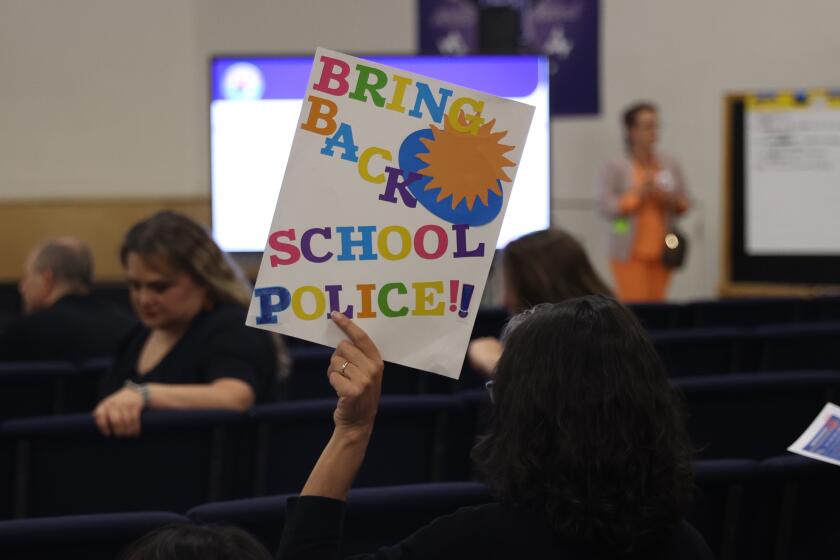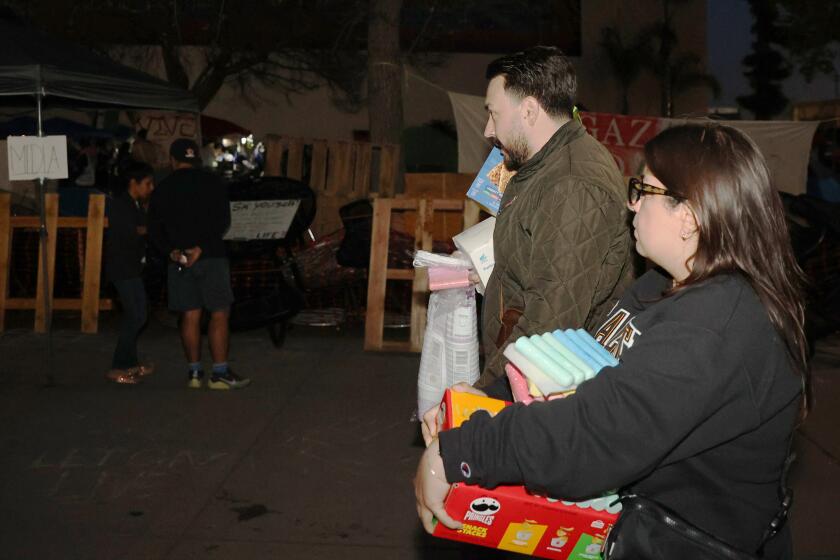SDSU Faculty Rallies Against Day’s Budget Cuts
About 470 San Diego State University professors vented their frustrations against university President Thomas Day and his budget-cutting plan Monday in one of the largest gatherings of faculty in the university’s history.
With all but a handful of votes in opposition, the professors reaffirmed their academic Senate’s vote of no-confidence against Day two weeks ago and adopted a resolution to urge the Senate to disavow support of a “deep and narrow” budget-cutting strategy.
The meeting failed to reach a quorum of 550 people--half the faculty--and its actions did not bind the Senate, which called the meeting. The last time a general faculty meeting had been called was more than 20 years ago.
“It has no official capacity. When there’s not a quorum, the people who are here are just a group of faculty. . . . They are not representative of the faculty as a whole,” said Janis Anderson, who chairs the Senate and gave up the chair to Monday’s meeting after a quorum could not be convened.
Day, who was present at the beginning of the meeting as a member of the Senate, walked out after it was announced that a quorum had not been reached, saying, “I don’t want to be a part of a kind of a rump thing.”
The faculty members then held their own meeting, with professor emeritus Bill Phillips as chair, and voted on a string of resolutions, including one to ask the Senate to call another general faculty meeting in late August.
Professors lashed out at the proposed budget cuts and with what they feel has been Day’s unwillingness to consult with the faculty before sending layoff notices to 193 university employees, including 145 tenured and probationary-tenure professors.
Day’s budget plan would also eliminate nine academic departments in an attempt to deal with an anticipated $11.5 million in cuts by the state Legislature.
“This administration under the leadership of Thomas Day has intentionally split this faculty so that we are saying ‘Better them than us. Better some other department that we don’t even know because they haven’t published as much, they haven’t gotten as many research grants and they are not as important to the core of the university as we are,’ ” said sociology professor William Sanders.
“What we must do is reject not only Thomas Day, but his notions, his programs, and everything he’s done in his 14 years that he has been here,” said Sanders, whose department will be hit hard by cuts.
Others were more blunt in calling for Day’s removal.
“I am not ever going to feel good about Day’s leadership, I think he’s disqualified himself from leading this university, and the sooner he is out, the better,” said English professor Gerald Farber.
In rejecting Day’s plan of making “deep and narrow” cuts in departments, the faculty instead made a “turn down the lights” proposal that would make cuts of up to 50% in equipment and operating expenses, reduce administrative spending, slash the athletics budget and accept early retirement and proposed voluntary reductions in pay for faculty.
The plan will be brought to Day today in an all-day meeting with representatives of the faculty union, said Professor Michael Seitz, the SDSU representative to the California Faculty Assn.
“I believe that we have again provided the administration with some alternate plans, not just ‘deep and narrow’ and ‘across the board’ that are worthy of consideration,” Seitz said.
Seitz said he is not confident that Day will respond positively to the proposal.
“I would really like to see that happen, but I don’t know that President Day could back off from a position easily. I don’t know that he could, but I would wish for that,” Seitz said.
However, Seitz said Day “obviously cannot ignore almost 500 faculty separate from the Senate voicing their views. It would be difficult for any person of conscience to ignore that kind of vote.”
But Day seemed unimpressed by the action taken at Monday’s meeting.
“There doesn’t seem to be anything different that has happened that wasn’t already covered in the last two (academic) Senate meetings,” Day said.
“There’s not a lot of progress being made in everybody passing resolutions and sending materials hither and yon.”
More to Read
Start your day right
Sign up for Essential California for news, features and recommendations from the L.A. Times and beyond in your inbox six days a week.
You may occasionally receive promotional content from the Los Angeles Times.






